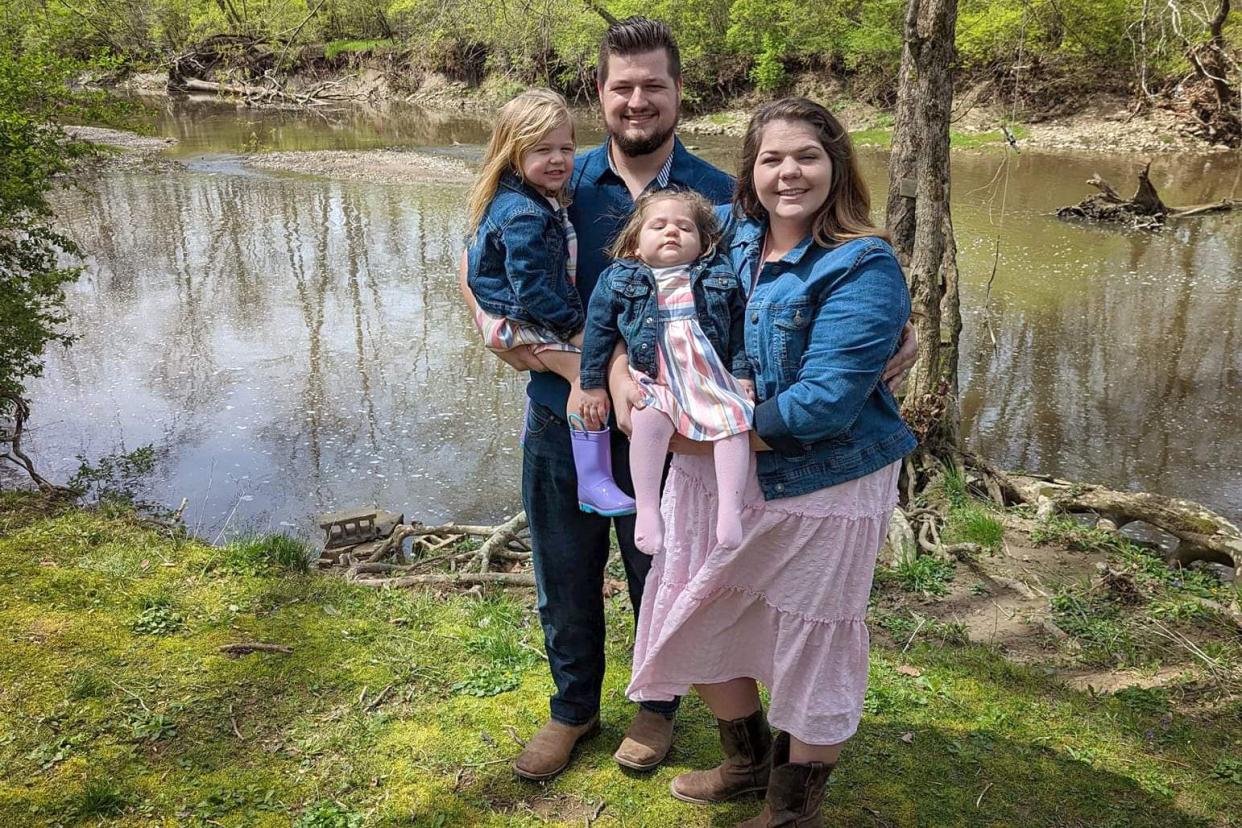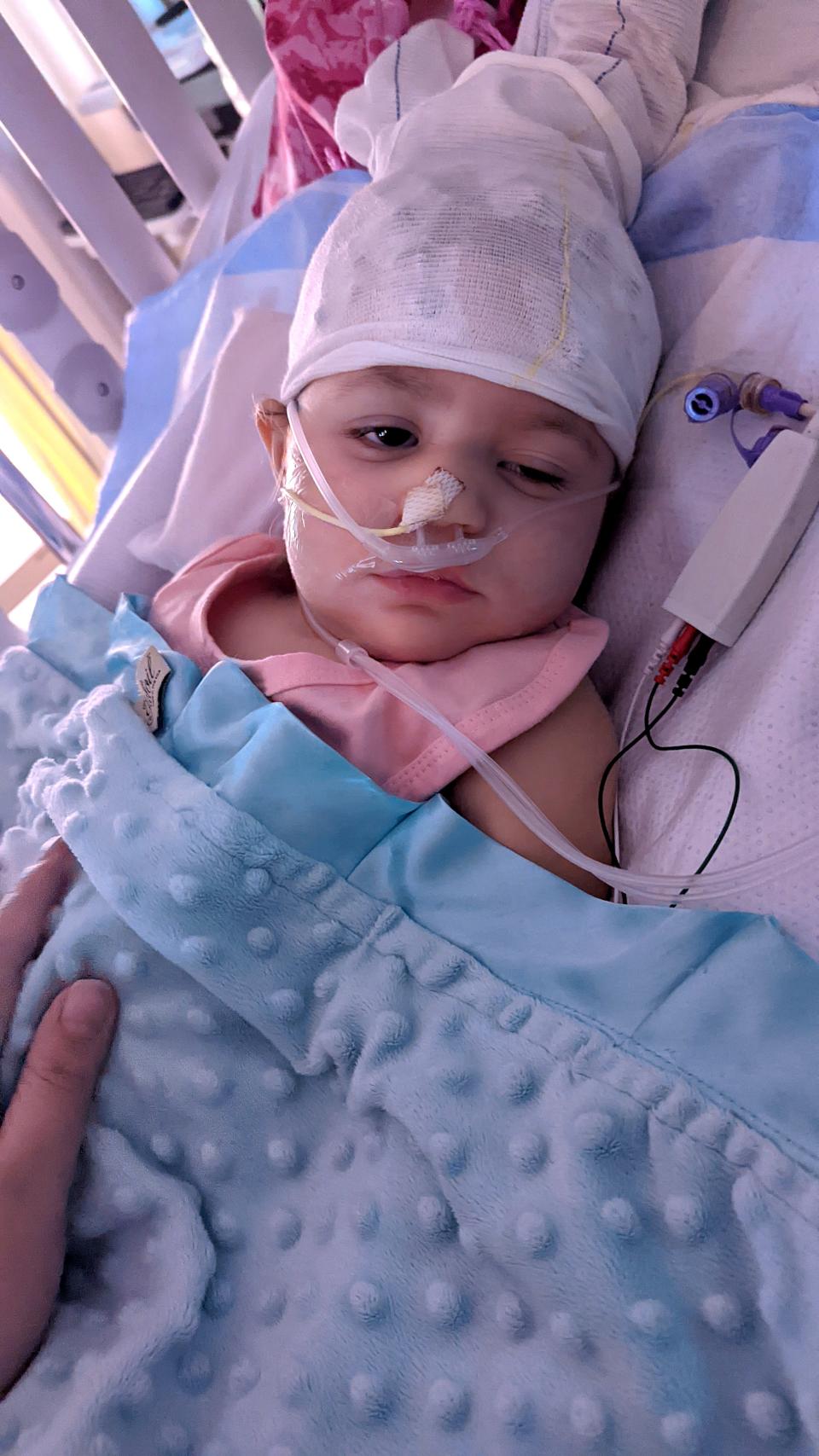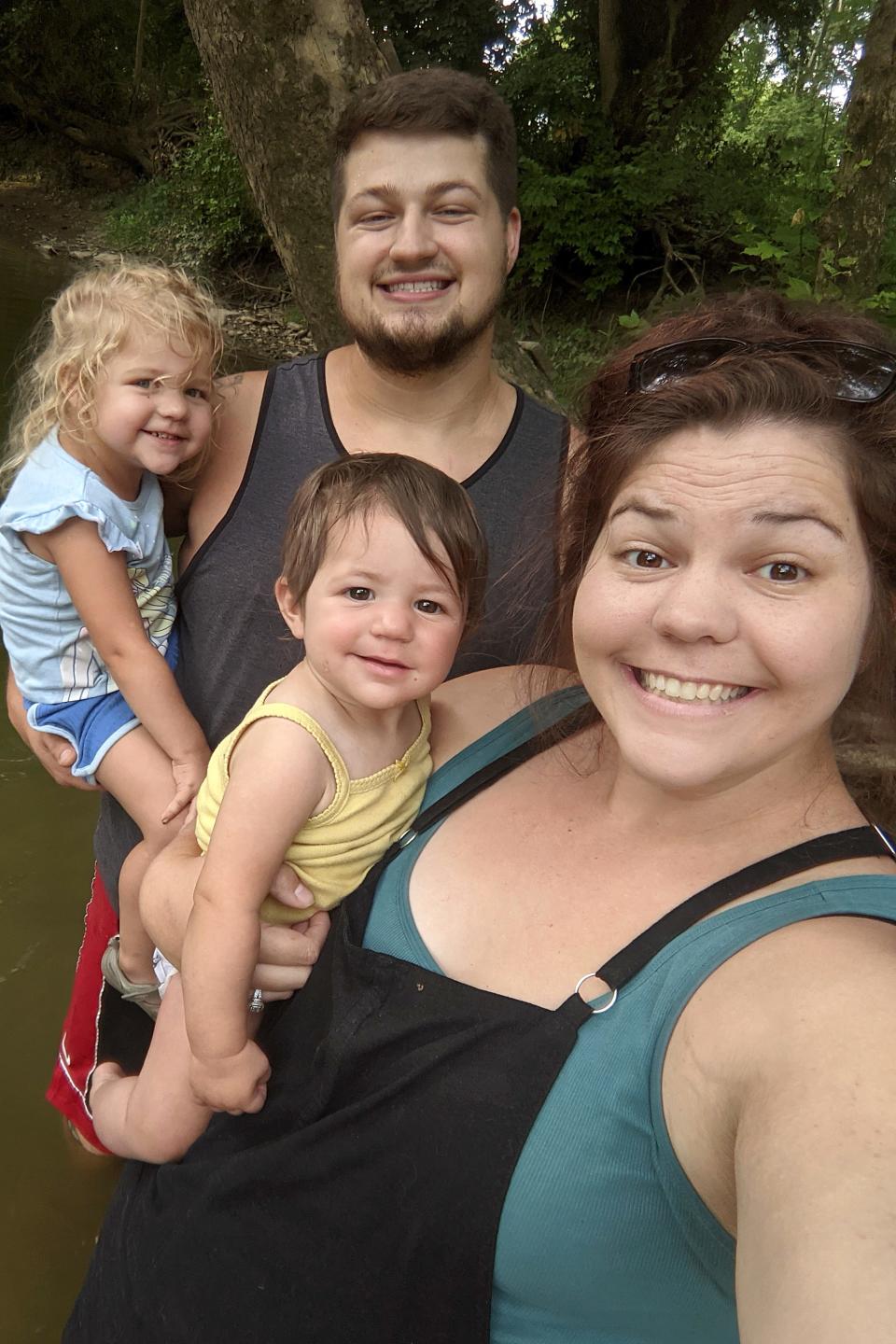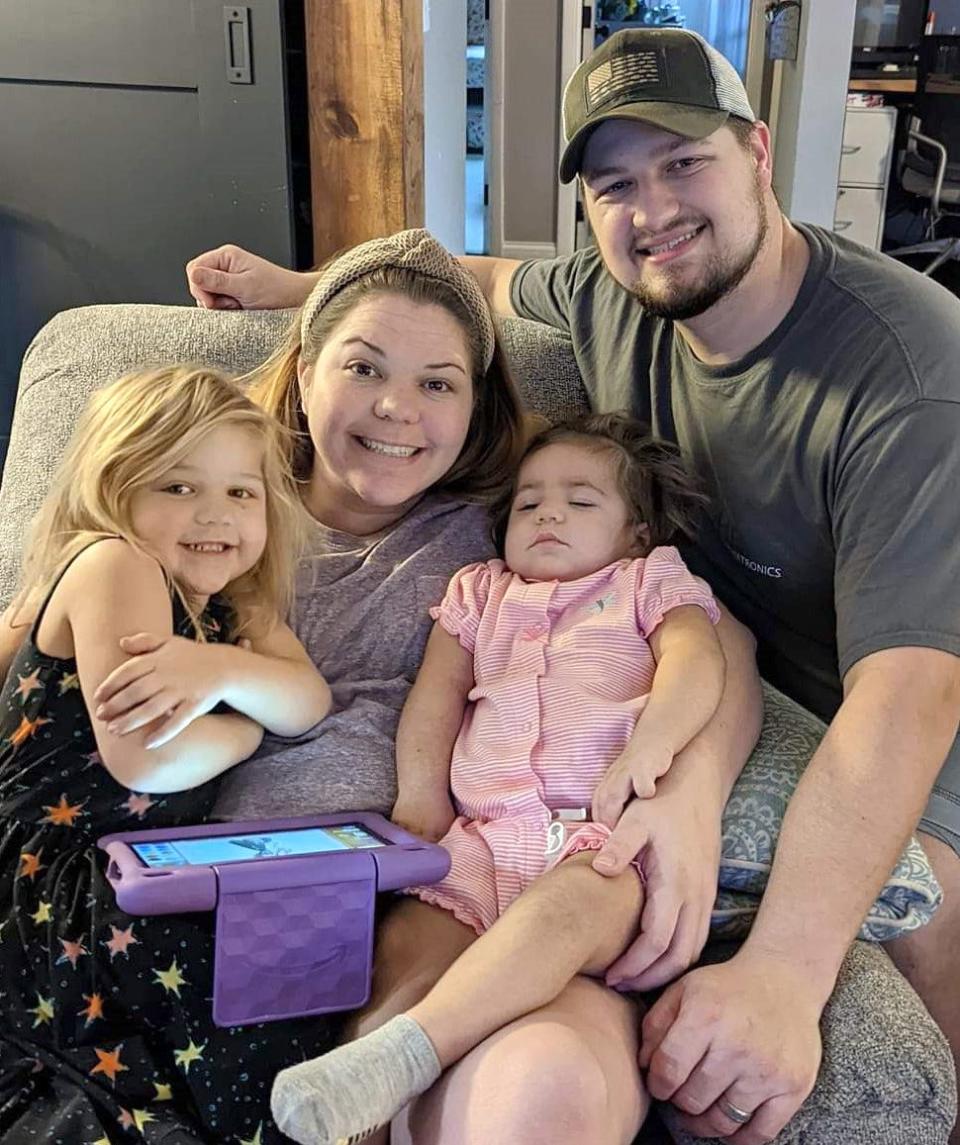From alarm to shock to hope and a new normal: Family battles toddler's rare disease

Aislynn would not wake up from her nap.
Jacob Wiley didn’t think too much about it. She was breathing and just seemed too tired to shake sleep.
So the 14-month-old's dad prepared to go to the hospital on Jan. 9. That’s where Aislynn’s sister, 3-year-old Adelaide, had been diagnosed with Kawasaki disease. It causes swelling in some blood vessels, and for Adelaide, a peculiar bruise on her back. The parents planned to switch places, so Ashley Wiley could come home with their little one.
But fear shot through Jacob Wiley when he came back to the crib and lifted Aislynn.
“Her body," he recalled. "It was completely limp."
The moment touched off a terrifying free fall for the Goshen Township parents. Jacob called his wife and rushed to Cincinnati Children’s Hospital Medical Center’s Liberty Township campus. There, Ashley scooped her baby from the car seat. And lost her composure.
“We were screaming and crying. We ran into the ER …’We need help! She won’t wake up.’
“She just was lifeless,” Ashley Wiley said.
A torrent of tests for baby Aislynn
It was the darkest day the parents had ever experienced. They'd been worrying about Adelaide having a condition that can cause life-threatening heart disease and aneurysms. Now their baby was sick. Her condition was scarier.
Two dozen of Cincinnati Children’s medical staff surrounded Aislynn, Ashley Wiley said. Someone bore a hole into her leg bone to start an IV. Quickly, they learned her blood sugar had dropped drastically, explaining why she could not wake up.
But why had Aislynn’s blood sugar plummeted?
It would be several days before specialists would diagnose Tango 2 disease, a genetic disorder that affects organs including the brain and heart. It is a disease so rare that Aislynn was only the 31st person in the world to be diagnosed with it, the first at Cincinnati Children's. It is so devastating that only about half of children diagnosed with it live past 9 years old.
Before the discovery came a cascade of tests. Aislynn and her sister were transferred to the Cincinnati Children’s main campus in Avondale for it all.
Brain imaging, bloodwork and a spinal tap were among the procedures that Aislynn underwent. “They were trying to figure out, does she have an infection? Does she have a disease?” her mother said.

Adelaide, meanwhile, was treated for Kawasaki and, the Wileys were relieved to see, responded well. “She is completely back to her sassy, spunky self,” her mother said.
For her younger daughter, Ashley Wiley persistently checked MyChart: “364 tests by day three,” she recalled. Some were repeated over and over.
Ashley and Jacob stayed upbeat with Adelaide and tried to comfort Aislynn.
“We were able to hold her hand and kiss her face and read to her,” Ashley Wiley said. She was apprehensive about touching her daughter after Aislynn was intubated and her head dotted with electrodes that helped doctors keep track of her brain activity.
Neurologists, cardiologists, endocrinologists and geneticists worked on Aislynn's case.
Four days into it, Dr. Amelle Shillington, an attending physician in Cincinnati Children's division of human genetics, made a decision that would speed up the diagnosis. She ordered whole exome sequencing – a way to check every gene in Aislynn's body for variations from what is normal.
The process can take four months or longer. Every person has about 20,000 genes. "It is a needle-in-a-haystack type of test," Shillington said.
But Cincinnati Children's and a partnering lab zeroed in on Aislynn's condition in days. Shillington was home on Jan.. 22 when she got a call from the lab and learned Aislynn had Tango 2 disease.
"I said, 'What the heck is Tango 2 disease?' "
Searching the disorder online, Shillington learned it was discovered in 2016. She found that Texas Children's Hospital in Houston had guidelines for managing the disease. Those guidelines gave Cincinnati Children's doctors more ways to care for Aislynn.
Learning more about Tango 2 and what was to come

Tango 2 is a gene that is important for mitochondrial function, and mitochondria are energy centers that power every cell, Shillington explained. Aislynn had a partial deletion of both of her Tango 2 genes, because her mother and father each were carriers of one gene with a small deletion.
The lack of well-functioning mitochondria most likely fueled the a drastic drop in blood sugar. Those with the disease (now that number stands at around 70) often end up with intellectual and physical disabilities. The disorder is characterized by seizures, and Aislynn had many.
Her brain was damaged, her parents learned from neurologists. "It did not look good," Shillington said.
She said children who have metabolic crises are given glucose to maintain their blood sugar levels. They get seizure-control medications and those with Tango 2 are treated for potential hypothyroidism and heart arrhythmias.
But with Tango 2 as the underlying cause, Shillington also learned something hopeful: Aislynn's situation might not be as dire as what the specialists initially feared.
"Even with such a hit to the brain, kids can recover," she said.
Aislynn improved with care at Cincinnati Children's. The electroencephalogram electrodes were removed from her head. The ventilator came off. She breathed on her own.
Aislynn woke up.
She left the hospital for home in March, her parents prepped with instructions and equipment and a multitude of appointments scheduled.
Finding a new normal
Aislynn can no longer crawl or talk. Her nutrition comes through a tube. She doesn’t express emotions except for crying, generally from pain, her parents said.

“She has good days and bad days,” Ashley Wiley said.
Her mother dedicates hours to therapy with her 18-month-old daughter, and Aislynn gets more at Cincinnati Children's.
“We’re so thankful for just the little things,” her mother said. Aislynn can swallow. She breathes on her own.
The Wileys don't know how far Aislynn will get with all her hard work. But, her mother said, “With each day, she’ll make some improvements.”
They'd fretted about whether Adelaide had Tango 2. Turns out she does not. They worried about how Adelaide would react to her sister, but Adelaide acted as if almost no time had passed and her little sister was the same.
“She just jumped back in with her big sister role,” Ashley Wiley said, laughing. "She wants to help."
Parents advocate for Tango 2 research
And as the Wileys care for Aislynn, they want to help other parents of kids with Tango 2 disease.
They joined a Facebook group of parents who have kids with the disease. “We’re using each others’ stories to treat our own children,” Ashley Wiley said.
They're raising money for the nonprofit Tango 2 Research Foundation so more kids can have better outcomes and fewer parents will be hit with such a bewildering diagnosis.
Now, Ashley looks back on Jan. 9, the harrowing day when Aislynn could not wake up, and feels fortunate.
It was a day, she wrote on Facebook, that she and Jacob will never forget: “The day that both my children were in the hospital. The day that I had the thought that there was even a possibility that I might be leaving the hospital without either one." It was the first day, she wrote, that she prayed with her “whole heart,” her “whole body." She says God got them through it.
Life is different now. But life is much brighter than it was in January. Or February. Or March, Ashley Wiley said.
“We made it a month. We made it two months. And now we're home," she said.
To other parents of children with rare diseases, Ashley has a message: "You can make it through, too.”
This article originally appeared on Cincinnati Enquirer: Kawasaki disease: Baby at Cincinnati Children's ER gets rare diagnosis

